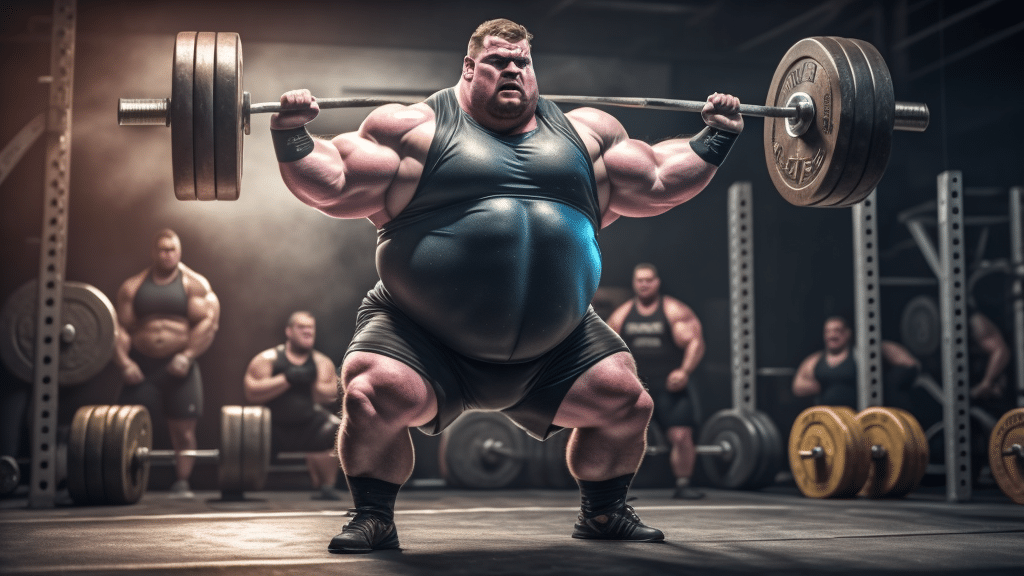Introduction
Powerlifters are often admired for their incredible strength and ability to lift heavy weights. However, some powerlifters seem to carry a higher body fat percentage. But why are powerlifters fat? In this article, we will explore the truth behind why some powerlifters may appear to have a higher body fat percentage, and why it is not necessarily a negative thing. By examining the science and training methods of powerlifters, we hope to shed light on the reasons behind their body composition and challenge the stereotypes associated with this sport.
What is Powerlifting?
Powerlifting is a competitive strength sport that involves three main lifts: the squat, bench press, and deadlift. The goal of powerlifting is to lift as much weight as possible for each of these exercises. Powerlifters compete in weight classes and are judged based on the amount of weight they lift relative to their bodyweight.
Why Are Powerlifters Fat? 6 Reasons
Powerlifters often have a higher body weight compared to other athletes due to the nature of their sport and training requirements. While it is not a requirement for powerlifters to be overweight, many choose to intentionally increase their body weight in order to maximize their strength and performance in the sport. There are several factors that contribute to powerlifters being overweight:
Reason #1 – Caloric Surplus
To support the heavy lifting and intense training sessions, powerlifters often consume a significant amount of calories. A caloric surplus is necessary to provide the body with the energy it needs to fuel workouts and facilitate muscle growth. The increased caloric intake can lead to weight gain, including an increase in both muscle mass and body fat.
Reason #2 – Strength Advantage
Carrying a higher body weight can provide powerlifters with a mechanical advantage, particularly in the squat and deadlift. The additional body weight can help improve stability and leverage, allowing them to lift more weight. This is especially beneficial in powerlifting competitions where the goal is to lift the maximum amount of weight possible.
Reason #3 – Weight Class Considerations
Powerlifting competitions are divided into weight classes, and some powerlifters may intentionally gain weight to compete in a higher weight class. By moving up to a higher weight class, they can potentially have a strength advantage over their competitors who may be naturally lighter. This strategic decision aims to maximize their chances of winning and setting new personal or world records.
Reason #4 – Muscle Mass
Powerlifting training focuses on building strength and muscle mass, which can contribute to an increase in body weight. Powerlifters often engage in high-intensity resistance training and progressive overload, which stimulates muscle growth and hypertrophy. As a result, powerlifters may have a higher proportion of muscle mass compared to other athletes, which can contribute to their overall body weight.
Reason #5 – Training Volume
Powerlifters typically have high training volumes, which means they perform a large number of sets and repetitions during their workouts. This increased training volume can contribute to muscle growth and an increase in body weight.
Reason #6 – Training Strategy
Powerlifting is not the same sport as bodybuilding. A powerlifters primary focus is to train in order to lift as much weight as possible, not to shape their physique and look lean.
Are There Drawbacks to Being Overweight as a Powerlifter?
While being overweight can have its advantages for powerlifters, there are also some drawbacks to consider. Here are a few:
Increased Risk of Health Issues
Carrying excess weight can put strain on the body, leading to an increased risk of health issues such as high blood pressure, cardiovascular disease, and joint problems. It’s important for powerlifters to monitor their overall health and seek guidance from medical professionals to ensure they are maintaining a healthy weight.
Decreased Mobility and Flexibility
Carrying extra body weight can make it more challenging to move and perform certain exercises. Powerlifters may struggle with agility, flexibility, and range of motion, which can limit their overall athletic performance and increase the risk of injury.
Difficulty in Lower Weight Classes
While some powerlifters intentionally gain weight to compete in higher weight classes, others may find it difficult to maintain a lower weight class due to their natural body composition. This can limit their ability to compete in certain competitions or may require them to undergo significant weight cuts, which can be detrimental to their overall health and performance.
Increased Fatigue and Recovery Time
Carrying excess weight can put additional stress on the body, leading to increased fatigue and longer recovery times. Powerlifters may need to pay extra attention to their sleep, nutrition, and recovery strategies to ensure they are adequately supporting their bodies.
Aesthetics and Body Image
While powerlifting focuses on strength and performance rather than aesthetics, some individuals may still struggle with body image and societal pressures surrounding weight. Being overweight can sometimes lead to negative self-perception and affect mental well-being. It’s important for powerlifters to prioritize their mental health and surround themselves with a supportive community that values strength and diversity in body types.
Conclusion
While it may be surprising to see that powerlifters are generally not in very good shape, there is a method behind their madness. Powerlifting is a sport that emphasizes strength and performance, rather than aesthetics or traditional ideas of being “in shape.” While some powerlifters may not have the same physical appearance as individuals who prioritize cardio or endurance-based exercises, their training and focus on building strength have its own benefits. Being strong does not necessarily mean you will also be lean.


